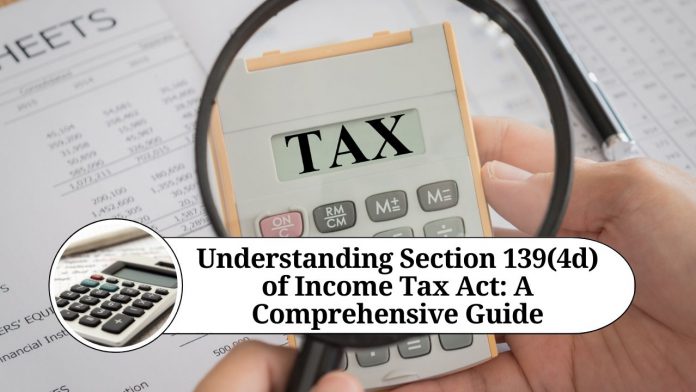Section 139(4d) of the Income Tax Act is a crucial provision that every taxpayer in India should be aware of. This section deals with the concept of a belated return, which is essentially a tax return that is filed after the due date has passed. In this blog, we will delve deeper into this provision and understand its implications for taxpayers.
What is a Belated Return?
A belated return is a tax return that is filed after the due date has passed. The due date for filing income tax returns in India is July 31st of every assessment year. However, taxpayers who miss this deadline can still file their returns by March 31st of the following year, which is the deadline for filing belated returns.
What is Section 139(4d) of the Income Tax Act?
Section 139(4d) of the Income Tax Act specifies that if a taxpayer fails to file his/her tax return by the due date, he/she can still file a belated return by the end of the assessment year or before the completion of the assessment, whichever is earlier.
This provision was introduced to enable taxpayers who missed the deadline to file their returns and avoid penalties and interest on any tax due. However, there are certain limitations to filing a belated return that taxpayers should be aware of.
Limitations of Filing a Belated Return
Filing a belated return comes with certain limitations that taxpayers should keep in mind. Firstly, the deadline for filing a belated return is March 31st of the assessment year, which means that taxpayers cannot file their returns beyond this date. Secondly, taxpayers who file belated returns are not eligible to carry forward any losses incurred during the financial year. Lastly, taxpayers who file belated returns are liable to pay interest on any tax due, as well as a penalty of up to Rs. 10,000.
Implications for Taxpayers
It is important for taxpayers to understand the implications of filing a belated return. Firstly, they will have to pay interest on any tax due, which can significantly increase the amount owed to the government. Secondly, taxpayers who file belated returns cannot carry forward any losses incurred during the financial year, which can affect their tax planning for future years. Lastly, taxpayers who fail to file their returns by the deadline may face penalties and legal action from the tax authorities.
Conclusion
Section 139(4d) of the Income Tax Act is an important provision that every taxpayer should be aware of. Filing a belated return can have significant implications for taxpayers, including penalties, interest, and the inability to carry forward losses. Therefore, it is advisable for taxpayers to file their returns on time and avoid the need to file belated returns. In case of any difficulties in filing returns, taxpayers should seek the assistance of a tax professional or reach out to the tax authorities for guidance.
Read more useful content:
- section 234e of income tax act
- section 286 of income tax act
- section 90a of income tax act
- section 40a(7) of income tax act
- section 226(3) of income tax act
- section 24 of income tax act
Frequently Asked Questions (FAQs)
Q: What is a belated return?
A: A belated return is a tax return filed after the due date has passed.
Q: What is the due date for filing income tax returns in India?
A: The due date for filing income tax returns in India is July 31st of every assessment year.
Q: What is Section 139(4d) of the Income Tax Act?
A: Section 139(4d) of the Income Tax Act specifies that if a taxpayer fails to file his/her tax return by the due date, he/she can still file a belated return by the end of the assessment year or before the completion of the assessment, whichever is earlier.
Q: What is the deadline for filing a belated return?
A: The deadline for filing a belated return is March 31st of the assessment year.
Q: Can taxpayers carry forward losses incurred during the financial year if they file a belated return?
A: No, taxpayers who file belated returns are not eligible to carry forward any losses incurred during the financial year.
Q: Are taxpayers who file belated returns liable to pay penalties?
A: Yes, taxpayers who file belated returns are liable to pay a penalty of up to Rs. 10,000.
Q: Are taxpayers who file belated returns liable to pay interest on any tax due?
A: Yes, taxpayers who file belated returns are liable to pay interest on any tax due.
Q: What are the implications of filing a belated return?
A: Filing a belated return can result in penalties, interest, and the inability to carry forward losses incurred during the financial year.
Q: Can taxpayers seek the assistance of tax professionals in filing their returns?
A: Yes, taxpayers can seek the assistance of tax professionals or reach out to the tax authorities for guidance in filing their returns.
Q: What should taxpayers do if they miss the deadline for filing their tax returns?
A: Taxpayers who miss the deadline for filing their tax returns should file a belated return before the deadline of March 31st of the assessment year to avoid penalties and legal action from the tax authorities.




















